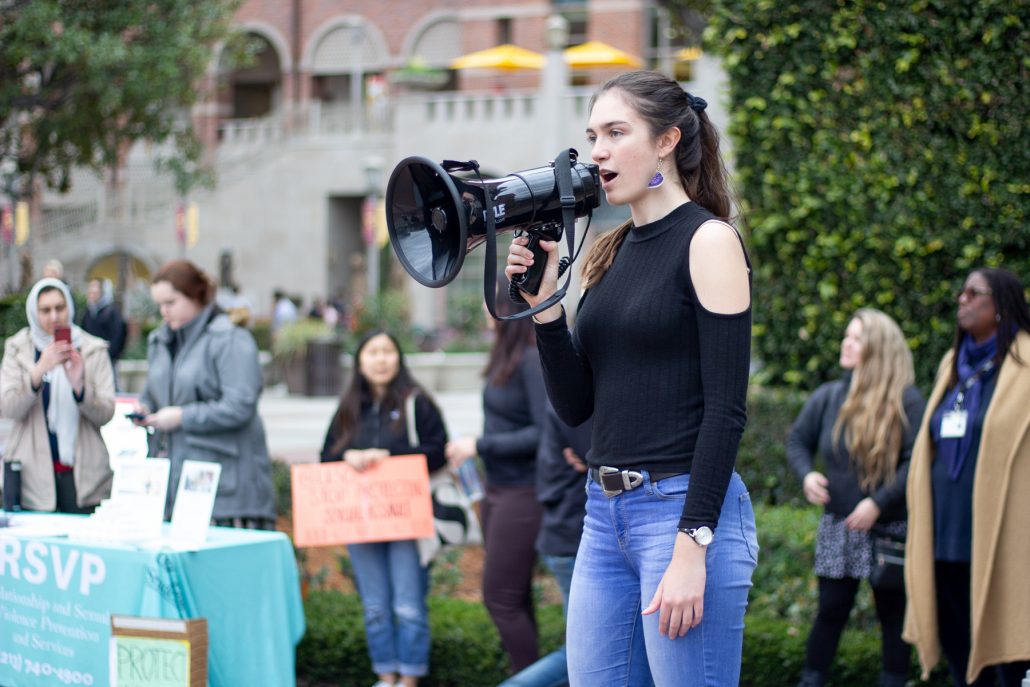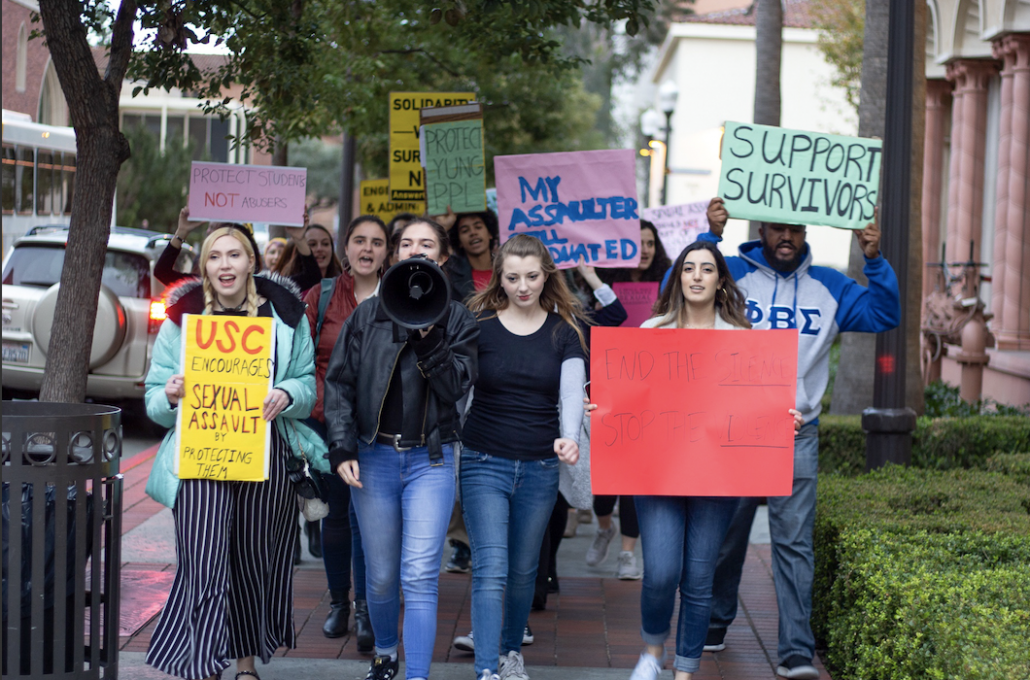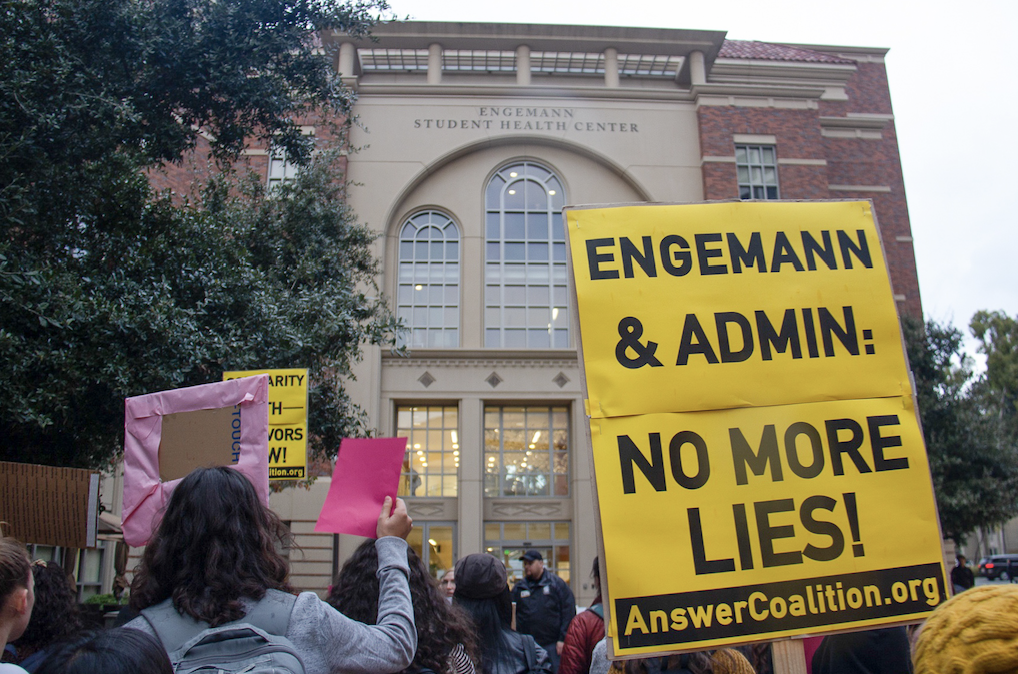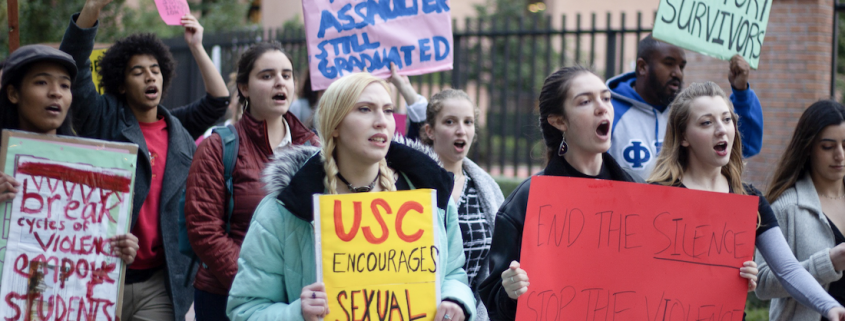Students protest USC health center abuses

Nearly 50 students, faculty and alumni marched from Tommy Trojan to the Engemann Student Health Center in the rain Wednesday to protest USC’s handling of sexual misconduct cases. The protest was partially prompted by new allegations made last week against former campus physician Dennis Kelly, who resigned last August.
Students organizing the protest said they felt the need to act after hearing the most recent allegations, which followed allegations of sexual misconduct against former campus gynecologist George Tyndall, who has been accused of harassment and abuse by over 500 women.
“I was disappointed by the lack of outrage on campus, but I realized that it wasn’t that students weren’t upset, it was that they didn’t have a place to be upset and to voice those concerns,” said Katie Thanos, a junior majoring in law, history and culture. “I feel like we needed to make a space for that, and that’s what today is.”
Since six LGBTQ former students filed a lawsuit last Monday against the University and Kelly for gender violence and sexual harassment, the University has yet to release an official public statement. Many of the protestors cited this in their reasons for marching.

Katie Hurley, a second-year graduate student studying social work, was one of the students who spoke to the crowd gathered at Hahn Plaza.
“It has become painfully clear that our Student Health Center is [an environment] where abusers thrive,” Hurley said. “[Chief Health Officer] Sarah Van Orman has made some really important changes … except it’s still putting the responsibility on students … what really needs to change is the environment.”
After hearing from various student representatives, the protestors marched to Engemann to deliver a list of demands, specifically to Van Orman, who did not come out to greet the demonstrators. The organizers demanded sensitivity training for all USC Student Health workers, dismissal of employees complicit in past sexual abuse and increased transparency from the University, among other requests.
The protest was organized by a number of campus organizations, including the Queer and Ally Student Assembly, which released its own statement last week.
“We want members of QuASA and students at large to know that we condemn these alleged actions in the strongest possible terms,” the statement read. “We are committed to pushing USC to make the safety of its students, particularly its marginalized students, [the] top priority.”
Justice for Trojans, a group formed by alumna Ariel Sobel last year in response to the allegations made against Tyndall, also helped organize the protest.
Sobel, a 2017 graduate who organized a protest against University administration last June, said she was proud of how Wednesday’s protest turned out.
“It’s really amazing to see current students fighting for justice of people that they don’t know,” Sobel said. “It shows a real moral compass.”

Sobel said she and her fellow organizers tried to make the list of demands representative of the student body’s needs. The organizers plan to incorporate the list into a petition for students, faculty and staff to sign.
“We tried to make it very inclusive,” Sobel said. “We had queer people, survivors … I’m really quite proud of how extensive [the demands] are.”
In the list of demands to the health center, protesters said the University must allocate more funding to the Relationship and Sexual Violence Prevention and Services program to make more resources available to students, faculty and staff.
RSVP director Brenda Ingram said that while the office has been underfunded in the past, since she started her position in July, the University has provided the office with more resources. RSVP has hired a violence prevention specialist and will look to hire advocates to support students.
According to Ingram, the office will host its first round of bystander intervention training Saturday, an event that will soon become a requirement for all campus organization leadership. The office also plans to have mandatory affirmative consent training for incoming students beginning in Fall 2019.
“Crisis is about danger and opportunity,” Ingram said. “There’s been some dangerous things going on and that opens the door to make some huge cultural shifts here at USC. I’m optimistic and hopeful that this is going to continue to give more resources to RSVP, and I’m seeing that happen.”
Undergraduate Student Government Sen. Michaela Murphy also spoke at the rally and apologized for USG’s silence regarding the recent allegations against Kelly and previous campus scandals. Murphy said she has pushed for USG officials to make statements on controversial issues on campus as a show of support for those affected, but she said the attempts were rejected.
“Even just a statement, a show of clear and strong support to the communities who are affected, is better than nothing at all,” Murphy said. “The fact that people had to essentially organize outside of student government to have a protest today is really shameful because if ever there were a time for student government leaders to step up and support students it’s today.”

In a statement obtained by the Daily Trojan, Van Orman said USC Student Health is committed to providing a “positive, enriching environment” for students on campus.
“USC supports and values all its members, including our LGBTQ+ community,” Van Orman wrote. “We take any student health care complaint seriously, and we are here to provide resources to support anyone who may need them.”
Joy Shin, a member of the Asian Pacific American Student Assembly, said she encouraged APASA members to attend the rally in support of victims of former campus gynecologist George Tyndall’s alleged sexual harassment. Many of the complaints against Tyndall say he targeted various minority groups in his treatments, including Asian students.
“I advocated for the Asian American community to stand in solidarity with all survivors, especially considering Dr. Tyndall specifically targeted a lot of people from our community,” Shin said. “I felt like I needed to show my support in some way and show the administration that there are students here who will rally on behalf of survivors.”

